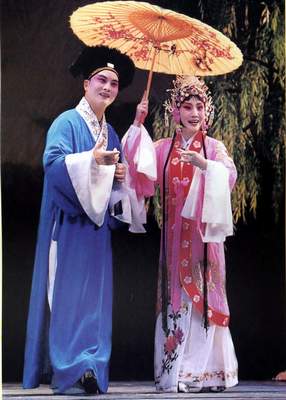Henan Opera
(chinaculture.org)
Updated: 2008-04-29 11:11
Updated: 2008-04-29 11:11

Henan Opera is commonly called "Henan Bangzi." The name of Henan Opera began to be used after the founding of the People's Republic of China in 1949. Henan Opera is popular among the provinces or regions of Henan, Hebei, Shandong, Shanxi, Hubei, Ningxia, Xinjing, making it one of the most influential operas in China.
Henan Opera came up at the end of Ming Dynasty and the beginning of Qing Dynasty. At the beginning, it was mainly song arias without make-up, which was popular among the ordinary people. As a result, it developed rapidly. The origin of Henan Opera is hard to trace, as stories of its conception differ.
After its founding, Henan Opera was divided into different brands. Four of the brands are: the Xiangfu tune (around Kaifeng), the Yudong tune (around Shangqiu), the Yuxi tune (around Luoyang), and the Shahe tune (around Luohe). The main divisions are the Yudong and Yuxi tunes. The Yudong tune was always used to express a comic style, while the Yuxi tune expressed tragic style.
Instruments such as the banhu, erhu, sanxian, pipa, dizi, sheng, and suona, and so on always accompany Henan Opera.
Henan Opera's styles are: very passionate and good at staging big shows; very natural, common, and close to ordinary people's life; and often with dramatic conflicts and complete stories.
Before 1927, there were no actresses in Henan bangzi. After actresses appeared, the opera created 5 performing sects, including Chang Xiangyu, Chen Suzhen, Ma Jinfeng, Yan Lipin, and Cui Lantian. Chang's is passionate and ardent; Chen's is light and fresh; Ma's is vigorous and bright; Cui's is deep and reserved; and Yan's is smooth and delicate.
There are more than 1,000 traditional repertoires of Henan Opera, among which mostly come from historical stories. Others depict marriage, love, and morality. After the foundation of New China, there appeared a lot of modern operas that depict reality, which enhanced Henan Opera.
Nowadays, while Henan Opera is still loved by common people, there are lots of severe problems in its development. The numbers of audiences are reducing, and it is very hard for many troupes to survive, let alone thrive. The performing groups' literature and art quality are far from the needs of modern society, and they lack the mastery of theory in the development of Henan Opera. Besides, succession and reform are basically nonexistent.
|
||
|
||
|
|
|
|
